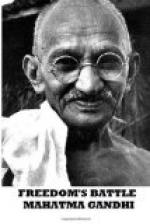He next objects to be ‘violence’ of my language. If truth is violent, I plead guilty to the charge of violence of language. But I could not, without doing violence to truth, refrain from using the language, I have, regarding General Dyer’s action. It has been proved out of his own mouth or hostile witnesses:
(1) That the crowd was unarmed.
(2) That it contained children.
(3) That the 13th was the day of Vaisakhi fair.
(4) That thousands had come to the fair.
(5) That there was no rebellion.
(6) That during the intervening two days before the ‘massacre’ there was peace in Amritsar.
(7) That the proclamation of the meeting was made the same day as General Dyer’s proclamation.
(8) That General Dyer’s proclamation prohibited not meetings but processions or gatherings of four men on the streets and not in private or public places.
(9) That General Dyer ran no risk whether outside or inside the city.
(10) That he admitted himself that many in the crowd did not know anything of his proclamation.
(11) That he fired without warning the crowd and even after it had begun to disperse. He fired on the backs of the people who were in flight.
(12) That the men were practically penned in an enclosure.
In the face of these admitted facts I do call the deed a ‘massacre.’ The action amounted not to ‘an error of judgment’ but its ’paralysis in the face of fancied danger.’
I am sorry to have to say that Mr. Pennington’s notes, which too the reader will find published elsewhere, betray as much ignorance as his letter.
Whatever was adopted on paper in the days of Canning was certainly not translated into action in its full sense. ’Promises made to the ear were broken to the hope,’ was said by a reactionary Viceroy. Military expenditure has grown enormously since the days of Canning.
The demonstration in favour of General Dyer is practically a myth.
No trace was found of the so-called Danda Fauj dignified by the name of bludgeon-army by Mr. Pennington. There was no rebel army in Amritsar. The crown that committed the horrible murders and incendiarism contained no one community exclusively. The sheet was found posted only in Lahore and not in Amritsar. Mr. Pennington should moreover have known by this time that the meeting held on the 13th was held, among other things, for the purpose of condemning mob excesses. This was brought out at the Amritsar trial. Those who surrounded him could not stop General Dyer. He says he made up his mind to shoot in a moment. He consulted nobody. When the correspondent says that the troops would have objected to being concerned in ’what might in that case be not unfairly called a ‘massacre,’ he writes as if he had never lived in India. I wish the Indian troops had the moral courage to refuse to shoot innocent, unarmed men in full flight. But the Indian troops have been brought in too slavish an atmosphere to dare do any such correct act.




